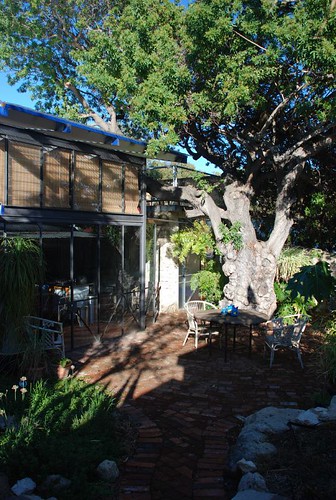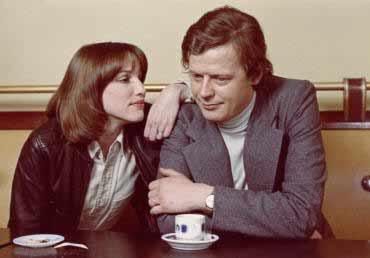We have just come back from a week in South Fremantle. We stayed at our favourite suburban eco-lodge, The Painted Fish. Currently owned by Tim and his wife Shani, it's a slice of old-school Fremantle in a town that is rapidly changing. I grew up around Fremantle and just south of there, so it is a place ripe with memory and association. This is the second time we have stayed at the Fish: finding accommodation in Fremantle is a fraught business. In May we looked far and wide (well, spent a couple of frustrating hours on line) before realising that, yes, we would be paying more to stay in Fremantle than we paid to stay in Paris.
Yes, you read that right.
Anyway, the upside of the Painted Fish comes with (sorry for this) actual frogs and is close to South Beach. The apartment runs on solar energy, has its own water tanks and the gardens are lush with green vegetables. Tim is a tireless worker and fixer-upper and the Fish is a monument to his labour.

This is a pic of the studio where we stayed. The tree was a magnet for bees and the ponds are home to motorbike frogs, named for the loud but not unpleasant croaking they make in the night. Iris enjoyed riding her scooter by the beach, we walked a lot and ate perhaps a little too well.
South Fremantle is something of a refuge (albeit a pricey one) from the centre of town, which is fast becoming a shell of itself. I am reminded of Peter Carey's story about a town that built a replica of itself that became a tourist attraction, the residents ever after forced to perform their own lives for the amusement of American visitors. Fremantle feels in danger of becoming that kind of place. South Terrace, or the cappuccino strip, is a long empty shell waiting for the tide of weekenders to fill the bars, cafes and pavements. With fast swelling suburbs to the south and east, Fremantle becomes a default destination. There are few other choices it seems.
Our trip was something of a flying visit, mainly to catch up with family and friends. I did get to surf at Scarborough with Jim and marked my thirtieth anniversary by riding a single-fin! Jim recently became a father of a handsome boy who looks uncannily like his grandfather.
We also saw Refat and Elmira Shakir-Aliev. Refat is a doctor of psychiatry but could just as well been a writer. But Uzbekistan in the 1950s was not a great time for writers or journalists. Refat told me a wonderful story about being at school when the teacher came in one morning sobbing with tears. What happened, he wondered? A student said that he saw the teacher hit on the head by a rock. Her tears continued. The class was mystified. The teacher raised her head from the desk and looked out at to the class. "Stalin is dead!" The whole class joined her in crying openly.
Refat tells this story with not cynical laughter, but laughter of one who long since learned the truth. Elmira's family lost their small land holdings under collectivisation and fled to Uzbekistan. So there were few illusions about Stalin. It puts my own memories of childhood into some kind of perspective. For sure and certain.










